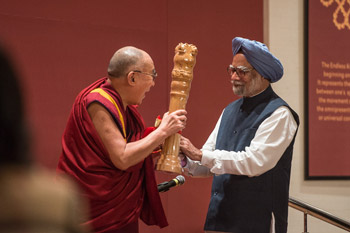New Delhi, India, 4 January 2016
His Holiness the Dalai Lama was very welcomed in Delhi today by old friends who wished to celebrate his reaching his 80th birthday. The event included a vivid exhibition of photographs that His Holiness took interest and pleasure in viewing, as images reminded him of people he’s met and places he’s been. Likewise, after a leisurely lunch, when His Holiness joined the party he was pleased to spot and greet old friends in the audience.
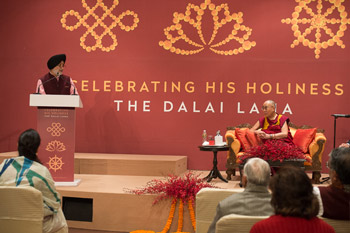
“I’m sure many of you are familiar with Winnie the Pooh and Piglet’s asking him, ‘How do you spell love?’ and Pooh’s reply, ‘You don’t spell it, you feel it.’ That’s what I thought when I first met His Holiness and he held my hand for almost our entire 40 minute meeting.”
Ram Jethmalani, one of India’s most celebrated lawyers, confessed he was a sinner who wondered why he’d been honoured with the opportunity to speak. He declared himself a great admirer of His Holiness who he sees as a living example of the practice of the Buddha’s teachings.
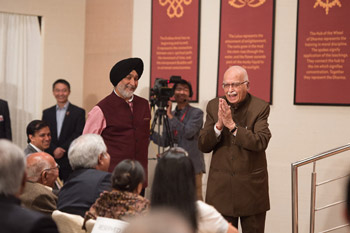
Former Deputy Prime Minister Shri LK Advani arrived and in his recollections spoke of his surprise in observing a few years ago in Rishikesh that whether it was a swami, a sadhu or a sannyasin, His Holiness would not spare his beard. He affectionately tugged on them all and nobody minded. They seemed to welcome it, because here was someone who thought ill of no one.
Next, Dr Kailash Satyarthi, who shared the 2014 Nobel Peace Prize with Malala Yousafzai, spoke of also being impressed by His Holiness when he was still a boy. He summarized his thoughts about him as four things beginning with the letter C – courage, which derives from morality, conviction and compassion, which is in each one us. Dr Satyarthi says that, like His Holiness, he has made it his mission to globalize compassion. The final ‘C’ was childhood, not in the sense of an age group, but as a value, a way of looking at the world. He suggested that in admiring His Holiness we celebrate a purity akin to that revealed by children.
Actor Sharmila Tagore paid tribute to His Holiness as the voice of reason and common sense, repeating one of his often cited quotations: ‘There is no need for temples; no need for complicated philosophy. Our own brain, our own heart is our temple; the philosophy is kindness.’
Scholar and very old friend of His Holiness’s, who he calls ‘Mata-ji’ Dr Kapila Vatsyayan praised him for having “brought Nagarjuna back to us” and for “embodying the compassion and altruism we celebrate”.
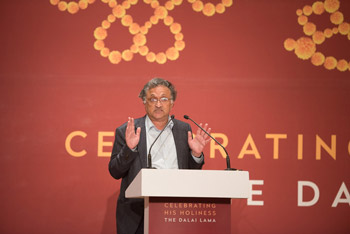
Historian Ramachandra Guha, who also takes an intense interest in the environment and cricket, told the audience he had not met His Holiness before. However, growing up in Dehra Dun, with its strong Tibetan presence, he has long been aware of him. He reported Ramachandra Gandhi’s pointing out to him how His Holiness is in perfect alignment with Mahatma Gandhi because of his absolute commitment to non-violence, his deep concern to foster inter-religious dialogue and the importance of pluralism and because of his love for all creatures. Guha noted he is also like Gandhi in his mischief and humour reporting an incident over lunch when someone asked, “Don’t you remember, we met when you came to visit Mother Teresa in Calcutta?” and His Holiness replied, “Well, I don’t remember you, but I remember Mother Teresa.”
Scholar and senior Indian politician, Dr Karan Singh recalled that in 1956, in the company of Pandit Nehru, Zhou Enlai first introduced him to His Holiness and the Panchen Rinpoche. He praised several of His Holiness’s qualities. His equanimity, which means that whatever happens he retains his sense of joy and the charismatic leadership with which he has kept the Tibetan community together despite great odds. Observing that His Holiness has been giving blessings all his life, Dr Karan Singh said that as his older friend he would like to offer some blessings in return and recited a verse, first in English,
May Mahalaxmi reside in your house,
May Sarasvati reside in your voice,
May your fame spread from country to country like the full moon,
May you be surrounded by followers for a hundred years,
and then in resonant Sanskrit.
National Convener of the Core Group for the Tibetan Cause, RK Kirmey, an Arunachali politician, suggested that India should support the cause of Tibet in order that His Holiness can return there in his lifetime. He prayed that he may continue to live long and in the best of health.
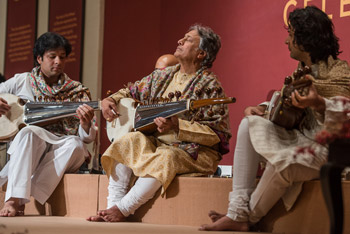
When everyone returned after a short break for tea, they were regaled by Sarod virtuoso, Ustad Amjad Ali Khan and his sons, playing Raag Shanti. A mesmerizing performance attracted hearty applause.
Distinguished jurist Fali Nariman observed two things about His Holiness, one, that he takes himself lightly and two, that he bears no enmity to anyone. He reported Bishop Desmond Tutu asking several years ago in London why people like Gandhi, His Holiness and Mandela are so popular. In answer to his own question he said, “Because all of us have an instinct for goodness. We recognise it when we see it.”
Scholar and present Lt Governor of Delhi, Najeeb Jung remarked that in traditional India, people thought of the land as enriched by the presence of rishis. He asserted that like Gandhi by his firmly upholding the cause of peace, His Holiness has made the country a better place. Former Finance Minister P Chidambaram expressed admiration for His Holiness’s description of himself:
“I’m a simple human being, a citizen of Tibet, who chose to be a Buddhist monk.”
At a time when there are 60 million displaced people in the world, His Holiness represents a group of such people and he constantly rekindles their hope with the determined advice that one day justice will prevail.
Social activist Aruna Roy echoed Bishop Tutu when she said of His Holiness, “There’s goodness in you, there’s truth in you, because you don’t say one thing and do another.” She added that hope is as important to life as food, “May you keep giving us hope.”
A Jain Acharya voiced fulsome praise of His Holiness in Hindi. He was followed by former British High Commissioner Sir Richard Stagg who extolled the qualities of humility, humanity, humour and hope for which His Holiness is a beacon. Former Indian Foreign Secretary, Shyam Saran reported seeing for himself in Tibet how strongly the people there hold His Holiness in their hearts, before he met him in person. He added, “Although His Holiness describes himself as fortunate in the welcome he has received in India, we, in fact, should be grateful that he turned to us.”
Dr Manmohan Singh, Prime Minister of India 2004-14 referred to His Holiness as a gift of God to the world.
“My encounters with him have always left me more at peace with my life,” he said. “Ours is a land of rishis and he is one of them helping guide the country on a righteous path. In these turbulent times, he teaches us to combine our spiritual values with our use of science and technology for material development. I can only pray that he lives long so the people of India, of Asia and the world may benefit from his blessings.”
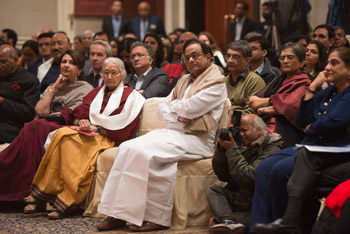
Finally, Ms Komal GB Singh requested His Holiness to address the gathering. He began in his customary way:
“Respected elder brothers and sisters, younger brothers and sisters, today you have held this event to celebrate my 80th birthday. I very much appreciate it. Some of you are among my oldest friends. I have spent the major portion of my life in India. Under difficult circumstances I have really come to value India’s freedom and I appreciate your warm feelings towards me. However, in the face of what may sound like too much praise, I have to remind myself, ‘I’m a monk, I’m a Buddhist monk.’
“I would like to take this opportunity to share with you my three commitments. I’m a human being, one of the 7 billion alive today. Because our own future depends on other people, we each have a responsibility to think about them and the world in which we live.
“Altruism doesn’t mean that you neglect yourself or your own welfare. But we all need friendship and friendship depends on trust. Showing concern for others is what gives rise to trust. It’s common sense, and something we can see for ourselves, that a wealthy man who trusts no one will never be happy, while a poor man who is surrounded by friends is full of joy. Therefore, caring for others is the best way to fulfil our own concerns.
“This is linked to cultivating a sense of the oneness of humanity, which I talk about wherever I go. As a result I have friends in every part of the world. And in relation to that, many scientists are taking interest in how peace of mind contributes to our general well-being. The ancient Indian knowledge of the workings of the mind and emotions is profound. Ancient Indian psychology was advanced.”
His Holiness spoke of the knowledge received from ancient India and kept alive in Tibet. He suggested that Tibetans have not only been chelas or disciples, but have been reliable chelas, because during the ups and downs of history they have kept this knowledge alive.
“This knowledge largely belongs to the Nalanda tradition. It is now time, my respected Indian brothers and sisters to pay more attention to your ancient heritage and combine its values with science and technology to ensure the greatest benefit. Ahimsa in not just a matter of being non-violent in our actions, but also of being compassionate in our hearts. Just as we observe physical hygiene to defend our bodily health, we need a sense of emotional hygiene to preserve our inner peace and overall well-being. A genuine sense of compassion is based on seeing all human beings as essentially the same.”
His Holiness mentioned his commitment to promoting inter-religious harmony. He repeated his long-standing admiration for the way the indigenous religions of India, the various Hindu traditions, Jainism, Buddhism and so forth, live in harmony, side by side with traditions that originated elsewhere, like Zoroastrianism. Judaism, Christianity and Islam. In ahimsa and inter-religious harmony India sets an example to the rest of the world.
Thirdly, His Holiness declared that he is of course a Tibetan. However, he made clear that he has not only retired personally from all political responsibility, but has happily and voluntarily brought an end to the involvement of Dalai Lamas in political affairs. His concern today is for Tibet’s ecology. Tibet’s role in climate change is equivalent to that of the North and South poles, prompting some to refer to Tibet as a Third Pole. High altitude makes Tibet’s ecology particularly fragile and once damaged harder to restore.
In addition, His Holiness regards Tibetan culture as a culture of peace and non-violence that can be of real value to the rest of the world. Therefore it is important to keep it alive. While its religious aspects are really only the concern of Buddhists, Buddhist science and philosophy can be studied under academic conditions, potentially of interest and benefit to anyone.
“The Buddha uniquely advised his followers not to accept what he taught at face value out of devotion, but to investigate and test it in the light of reason,” His Holiness explained. “This healthy scepticism is attractive to scientists and has been a basis of the fruitful discussions we have held over the last thirty years.
“Please keep these three commitments of mine in mind and if they can be of any help to you, you are welcome to put them into effect. I appreciate all of you coming here today and would like to thank the organizers for all their efforts.”
On behalf of the organizers, Dr Manmohan Singh presented His Holiness with a carved sandalwood replica of the Lion Capital that adorned the Ashokan Pillar in Sarnath. The four lions back to back represent power, courage, pride, and confidence and are now one of the emblems of India. Sarnath is where the Buddha first taught the Four Noble Truths.
Analjit Singh thanked all who had spoken and shared their reflections. On behalf of everyone who had taken part in what he called a very special day, he expressed prayers and good wishes for His Holiness’s continuing good health, happiness and peace.
Tomorrow, at the end of a successful tour of more than a month that has taken him to Delhi, Bengaluru, Hunsur and Bylakuppe, His Holiness the Dalai Lama will return to Dharamsala.
